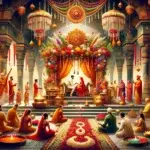Jyotish Vedic Astrology is an ancient system of astrology that originated in India thousands of years ago. It is based on the belief that the positions and movements of celestial bodies can have a profound impact on human life. Understanding the basics of Jyotish Vedic Astrology is important because it can provide valuable insights into various aspects of life, including career, relationships, and health. By studying the planets, houses, signs, and nakshatras, one can gain a deeper understanding of themselves and their place in the universe.
Understanding the Basics of Jyotish Vedic Astrology
Jyotish Vedic Astrology, also known as Hindu astrology, is a complex system that differs from Western astrology in several ways. While Western astrology focuses on the position of the Sun at the time of birth, Jyotish Vedic Astrology takes into account the positions of all nine planets at the time of birth. Additionally, Jyotish Vedic Astrology uses a different zodiac system called the sidereal zodiac, which is based on the actual positions of the stars.
The three main components of Jyotish Vedic Astrology are the planets, houses, and signs. The nine planets in Jyotish Vedic Astrology are the Sun, Moon, Mars, Mercury, Jupiter, Venus, Saturn, Rahu (North Node), and Ketu (South Node). Each planet has its own unique characteristics and influences different aspects of life. The houses represent different areas of life, such as career, relationships, and health. The signs represent different personality traits and characteristics.
The History and Origins of Jyotish Vedic Astrology
Jyotish Vedic Astrology has its roots in ancient India and has been practiced for thousands of years. It is believed to have originated during the Vedic period, which lasted from around 1500 BCE to 500 BCE. During this time, the ancient seers or Rishis developed a deep understanding of the cosmos and its influence on human life.
The influence of Hinduism and Buddhism played a significant role in the development of Jyotish Vedic Astrology. Hinduism, with its belief in karma and reincarnation, emphasizes the idea that our actions in past lives can influence our current life. Jyotish Vedic Astrology is seen as a tool to understand and navigate the effects of past actions. Buddhism, with its focus on self-awareness and enlightenment, also influenced the practice of Jyotish Vedic Astrology by emphasizing the importance of self-reflection and understanding.
Over time, Jyotish Vedic Astrology evolved and incorporated various influences from different cultures and traditions. It has been influenced by Greek astrology, Persian astrology, and even Chinese astrology. Today, Jyotish Vedic Astrology continues to be practiced and studied by millions of people around the world.
The Importance of Planets in Jyotish Vedic Astrology
In Jyotish Vedic Astrology, the nine planets play a crucial role in determining various aspects of one’s life. Each planet has its own unique characteristics and influences different areas of life. The Sun represents the self, vitality, and leadership qualities. The Moon represents emotions, intuition, and nurturing qualities. Mars represents energy, courage, and assertiveness. Mercury represents communication, intelligence, and adaptability. Jupiter represents wisdom, expansion, and abundance. Venus represents love, beauty, and harmony. Saturn represents discipline, responsibility, and hard work. Rahu represents ambition, desire for material success, and obsession. Ketu represents spirituality, detachment, and liberation.
The positions of these planets at the time of birth can have a significant impact on one’s personality traits, strengths, weaknesses, and life experiences. By studying the planetary positions in a birth chart, an astrologer can gain insights into an individual’s potential and challenges.
The Role of Houses and Signs in Jyotish Vedic Astrology
In Jyotish Vedic Astrology, the houses and signs are also important components that provide valuable information about different aspects of life. The twelve houses represent different areas of life, such as career, relationships, health, and spirituality. Each house has its own unique significance and is ruled by a specific planet.
The twelve signs represent different personality traits and characteristics. They are divided into four elements – fire, earth, air, and water – and three qualities – cardinal, fixed, and mutable. Each sign is ruled by a specific planet and has its own unique qualities.
The interaction between the houses and signs in a birth chart provides valuable insights into an individual’s strengths, weaknesses, and potential challenges. For example, if the Sun is placed in the tenth house of career in the sign of Aries, it indicates that the individual may have a strong drive for success and leadership qualities in their career.
How to Read and Interpret a Jyotish Vedic Astrology Chart
A Jyotish Vedic Astrology chart, also known as a birth chart or horoscope, is a map of the positions of the planets at the time of birth. It consists of twelve houses, each representing a different area of life, and twelve signs, each representing different personality traits.
To read a Jyotish Vedic Astrology chart, one must first understand the basic components. The Ascendant or Lagna represents the self and is determined by the sign that was rising on the eastern horizon at the time of birth. The planets are placed in different houses and signs based on their positions at the time of birth. The aspects between planets indicate how they interact with each other.
Interpreting a Jyotish Vedic Astrology chart requires a deep understanding of the meanings and influences of the planets, houses, and signs. By analyzing the positions and aspects of the planets, an astrologer can gain insights into an individual’s personality, strengths, weaknesses, and potential challenges.
The Different Types of Jyotish Vedic Astrology Charts
In addition to the birth chart, there are several other types of charts used in Jyotish Vedic Astrology to gain deeper insights into different aspects of life. The Navamsa chart is a divisional chart that provides information about relationships, marriage, and spiritual growth. The Dashamsha chart is a divisional chart that provides information about career, reputation, and social status. Each chart provides a different perspective and can be used to gain a more comprehensive understanding of an individual’s life.
The Significance of Nakshatras in Jyotish Vedic Astrology
Nakshatras are an important component of Jyotish Vedic Astrology. They are lunar mansions or star constellations that divide the zodiac into 27 equal parts. Each Nakshatra has its own unique qualities and influences different aspects of life.
The Nakshatras provide valuable insights into an individual’s personality traits, strengths, weaknesses, and potential challenges. By studying the Nakshatras in a birth chart, an astrologer can gain a deeper understanding of an individual’s life path and purpose.
How Jyotish Vedic Astrology Can Help with Life Decisions
Jyotish Vedic Astrology can be a valuable tool for gaining insight into various aspects of life and making informed decisions. By studying the planetary positions in a birth chart, one can gain insights into career choices, relationships, and health issues.
For example, if an individual is considering a career change, an astrologer can analyze their birth chart to determine their strengths, weaknesses, and potential challenges. By understanding their unique qualities and potential, they can make a more informed decision about their career path.
Similarly, Jyotish Vedic Astrology can provide insights into relationships by analyzing the compatibility between two individuals’ birth charts. By understanding the strengths and challenges of a relationship, one can make more informed decisions about their romantic partnerships.
Jyotish Vedic Astrology can also provide insights into health issues by analyzing the planetary positions in a birth chart. By understanding the potential health challenges indicated in the chart, one can take proactive measures to maintain their well-being.
The Dos and Don’ts of Jyotish Vedic Astrology
When it comes to Jyotish Vedic Astrology, it is important to find a qualified practitioner who has a deep understanding of the system. A qualified practitioner will have studied Jyotish Vedic Astrology for many years and will have a solid foundation in the principles and techniques.
It is also important to use Jyotish Vedic Astrology as a tool for self-reflection and understanding, rather than as a definitive answer to life’s questions. While Jyotish Vedic Astrology can provide valuable insights, it is ultimately up to the individual to make decisions and take action in their life.
Maintaining a healthy skepticism is also important when it comes to Jyotish Vedic Astrology. While it can provide valuable insights, it is not a magical solution that can predict the future or solve all of life’s problems. It is important to approach Jyotish Vedic Astrology with an open mind and use it as a tool for self-awareness and personal growth.
The Benefits and Limitations of Jyotish Vedic Astrology
The benefits of using Jyotish Vedic Astrology are numerous. It can provide valuable insights into various aspects of life, including career, relationships, and health. By understanding the planetary positions in a birth chart, one can gain a deeper understanding of themselves and their potential.
However, it is important to recognize the limitations of Jyotish Vedic Astrology. While it can provide valuable insights, it is not a definitive answer to life’s questions. It is ultimately up to the individual to make decisions and take action in their life.
Finding a Qualified Jyotish Vedic Astrology Practitioner
When it comes to finding a qualified Jyotish Vedic Astrology practitioner, it is important to do your research and find someone who has a solid foundation in the principles and techniques of Jyotish Vedic Astrology. Look for someone who has studied Jyotish Vedic Astrology for many years and has a deep understanding of the system.
You can find qualified practitioners through recommendations from friends or family members who have had positive experiences with Jyotish Vedic Astrology. You can also search online for practitioners who have good reviews and testimonials.
When choosing a practitioner, it is important to trust your intuition and find someone who resonates with you. It is important to feel comfortable and safe with the practitioner, as you will be sharing personal information and discussing sensitive topics.
In conclusion, Jyotish Vedic Astrology is an ancient system of astrology that provides valuable insights into various aspects of life. By studying the planets, houses, signs, and nakshatras, one can gain a deeper understanding of themselves and their potential. While Jyotish Vedic Astrology can provide valuable insights, it is important to approach it with an open mind and use it as a tool for self-reflection and personal growth. By finding a qualified practitioner and maintaining a healthy skepticism, one can make the most of Jyotish Vedic Astrology and use it to navigate life’s challenges and make informed decisions.










